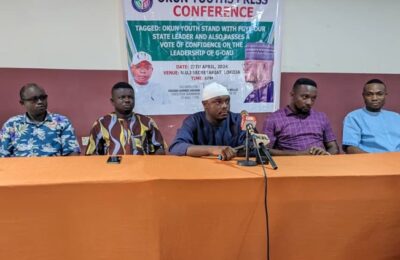The report by the Nigeria Governors Forum (NGF) Secretariat described financial state of Kogi State as unhealthy. Other states that are categorised under unhealthy states are; Cross River, Ebonyi, Enugu, Kaduna, Ogun, Ondo, Taraba and Yobe.
The report listed 16 states as “bankrupt”, nine “unhealthy”, six “critical” and five “distressed” as a result of the implementation of the minimum wage which commenced August 2011.
The report listed the following states as being in distressed situation following the implementation of the wage: Katsina with a total yearly revenue of N33.2 billion and a total year wage bill of N21.71 billion or 65.4 per cent of the state total revenue; Niger with a total yearly revenue base of N32.3 billion and a wage bill of N23.4 billion or 72.4 per cent; and Sokoto with a total yearly revenue of N29.2 billion and a yearly salary bill of N23.4 billion or a 80 per cent of the total revenue.
Also listed is Zamfara with a total yearly revenue base of N27.5 billion to a yearly wage bill of N19.24 billion or 70 per cent.
All these, the report said, were based on a 30-per-cent increase in personnel cost.
Other states listed to be in critical positions include Adamawa, Benue, Edo, Ekiti, Osun and Plateau.
Specifically, the report stated that Adamawa with a yearly revenue base of N29.2 billion will expend N15.21 billion on salaries and wages, which represent a 52.1 per cent of personnel cost of the total revenue, while Benue with a N35.3 billion yearly revenue, which yearly salaries will gulp N19.37 billion or 54.9 per cent of personnel cost.
Edo with a total yearly revenue base of N40.9 billion will finance a wage bill of N22.23 billion or a 54.4 per cent of personnel cost.
Ekiti is among the states listed within the range of states in critical situation. The state has a yearly revenue base of N23.6 billion, but has a yearly wage bill of N14.82 billion or a 62.8 per cent of the personnel cost.
Plateau has N28.1 billion as total revenue with N15.99 billion as personnel cost or a 56.9 per cent.
The following states were described as healthy and therefore can pay the 30-per-cent incremental wage bill. They are: Abia, Akwa Ibom, Anambra, Bauchi, Bayelsa, Delta, Gombe, Imo, Jigawa, Kebbi, Kwara, Lagos, Nasarawa, Oyo and Rivers.
The report, which stated that Rivers has a total yearly revenue base of N184.5 billion, has a yearly wage bill of N47.45 billion or 25.7 per cent of personnel cost.
In the same vein, Akwa Ibom has a yearly revenue base of N144.4 billion and a personnel cost of N23.27 billion or 16.1 per cent.
Lagos State has a yearly revenue base of N182.8 billion and a wage bill of N42.51 billion or a 23.3 per cent of the personnel cost.
According to the report, the implementation of the Minimum Wage Act by these states would have a negative impact on their ability to create jobs and at great opportunity cost on other government projects.
Apart from this, the report said the implementation of the Act would negatively affect the basis of true federalism in Nigeria.




